
Yamaha MSG or Image Guitar
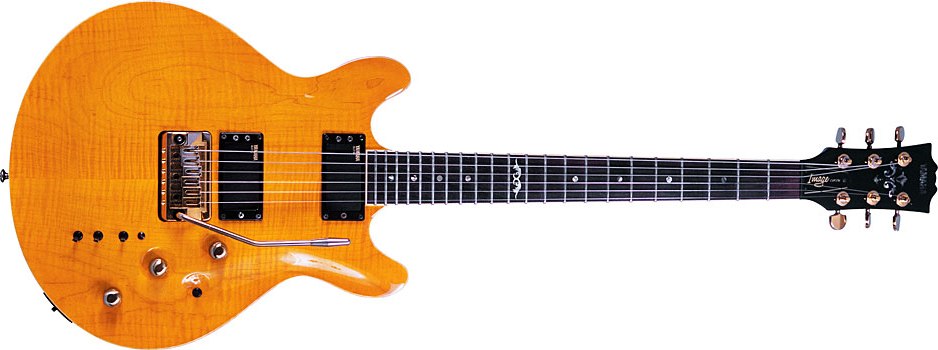
Blonde Custom
Update July 2022
I have had some correspondence with Martyn Booth and he has asked me too record some of his knowledge of the guitars
that he designed and built. As a result I am completely re-writing these pages and will frequently quote Martyn's words from his email.
Here goes for hopefully a much better page.
It is generally thought that all these guitars were made in Taiwan. This isn't the complete story
It seems most of these were made in Taiwan and some in Japan, but I have no knowledge of which models or
whether or not all models were made in both countries. This is not unusual for Yamaha. In December 2018 a member of the
Yamaha Musicians Forum purcased an Image Deluxe with Made in Japan stamped on the headstock. Martyn himself thinks he has
seen a blue Image with Made in Japan on it (more later)
As stated these were designed in the UK by Martyn Booth ex Gibson Guitar technician of great talent, now a Luthier making custom guitars,
His website is now on my links pages.
Martyn designed this after seeing Gibson's 335s an apparently not great solid body 335 they released this in 1980 by 1987 Martyn was
working with Yamaha U.K. he designed the Image to complement Yamaha's SG line. In the UK known as the MSG (Martyn's Solid Guitar)
for branding reasons . It had a mahogany body with a carved maple cap and glued-in mahogany neck. Scale was 25", top binding was maple,
and finish options were blonde, cherry, and orange sunburst.
The MSG/Image guitars were made as three models.
The Standard had twin humbuckers, rosewood fingerboard, and a stop-tail with strings running through the body.
The Deluxe had an ebony 'board and RM Pro double-locking vibrato.
The Custom had a Brazilian rosewood fingerboard and the latest technology from Yamaha's Japanese labs; pickups were
Hybrid Integrated Pickup System (HIPS), with active/passive options, the vibrato was a then-new needle-bearing type
with a small thumbwheel on top for adjusting spring tension, and instead of a cumbersome locking nut, it had Gotoh
Magnum Lok tuners with a screw-down shaft that locks the strings in place.
In addition to the active/passive option (with its mini-toggle with LED), controls include a three-way mini-toggle,
volume, midrange boost, and passive tone controls. Two other mini-toggles serve as coil taps. Active mode basically
consists of a power-boost function, which can give nasty overdrive distortion depending on the amp and settings.
There are more versatile tonal arrangements, but this does give a lot of colour.
One of the coolest features of the Image Custom is a line of LED dot markers running along the top edge of the
fingerboard. A little switch where the jack normally would be turns on this groovy feature - so cool! Also worth
noting is the wide fingerboard and jumbo frets, both nice if you like them.
All weighed around 3.1 kgs
The MSG/Image debuted in '88. The following year, the headstock shape was altered a bit and the Volume knob moved
on the Standard and Deluxe models. Collectors often refer to these versions as Mark 1 and Mark 2, respectively. The line ended in 1994 approx.
Martyn Booth left Yamaha in 1990 to start his own shop. In 2002, he resurrected the design, trimmed it down a bit,
refined some features, and it's now available as the Martyn Booth Classic and Signature.
Comment from Martyn on Mark 1 and Mark 2
By late 1989 I had redesigned the headstock shape with a more protruding centre section and shortened the curve towards the nut.
The volume pot was moved a few millimeters away from the pickup because some people thought it was too close. I had originally placed
it more like a Strat to make it more accessible for violining, but it was a bit too much for people more used to Gibson style guitars!
To further complicate matters, during the crossover period some Mark 1 bodies had Mark 2 necks and vice versa! By 1990, everything should
have been the full Mark 2.
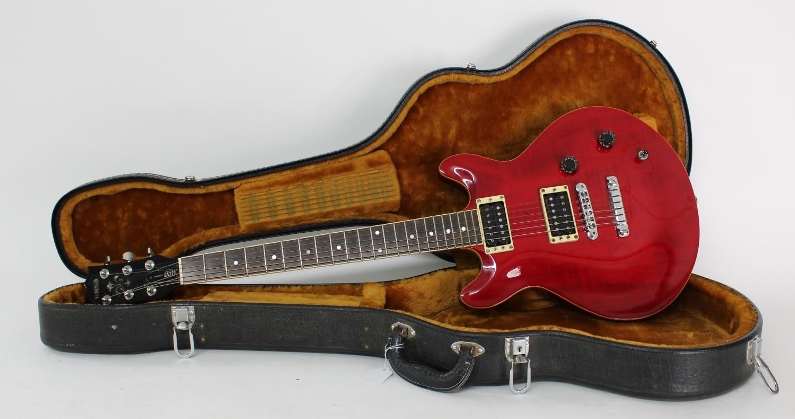
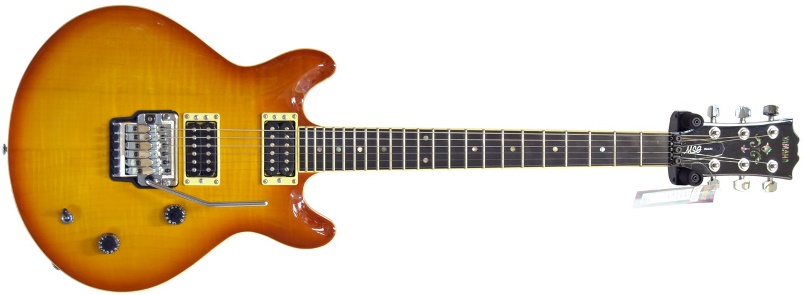
MSG Image Specifications
| Model | Standard | Deluxe | Custom |
| Period | 1989 to 1994 | 1989 to 1994 | 1990 to 1994 |
| Scale | 25 ins | 25 ins | 25 ins |
| Fretboard | Bound Rosewood | Bound Ebony | Bound Brazilian Rosewood |
| Frets | 22 | 22 | 22 |
| Body | Top Curly Maple Back Mahogany | Top Curly Maple Back Mahogany | Top Curly Maple Back Mahogany |
| Neck | Mahogany 350mm radius 43mm nut | Mahogany 350mm radius 43mm nut | Mahogany 350mm radius 43mm nut |
| Hardware | Chrome | Chrome | Gold |
| Bridge | Tune-O-Matic* | Rockin Magic Pro | Vintage pro with needle bearing vibrato |
| Pickups | 2 Live alnico 5s | 2 Live alnico 5s | 2 HIPS |
| Pickup Switch | 3 way selector | 3 way selector | Active passive options 3 way |
| Control | 1 vol 1 tone | 1 vol 1tone | 3 way mini-toggle, volume, midrange boost, and passive tone controls. 2 mini toggles for coil tap. |
| Colours | Cherry Orange Sunburst Blonde | Cherry Orange Sunburst Blonde | Cherry Orange Sunburst Blonde |
| Misc | Black Chrome lock nut | LED lights on Fretboard top Gotoh Magnum Lock Tuners |
*Update Feb 2022
Following some discussions on the Yamaha forum I have established that whilst the TOM bridge is a standard Yamaha one the tailpiece is
as far I can find unique to this guitar it is described in the catalogue as 2 way and allows for through body or just through tail piece stringing.
Buzzard from the Yamaha Forum has kindly provided the following pictures of a Custom. Thank you Peter
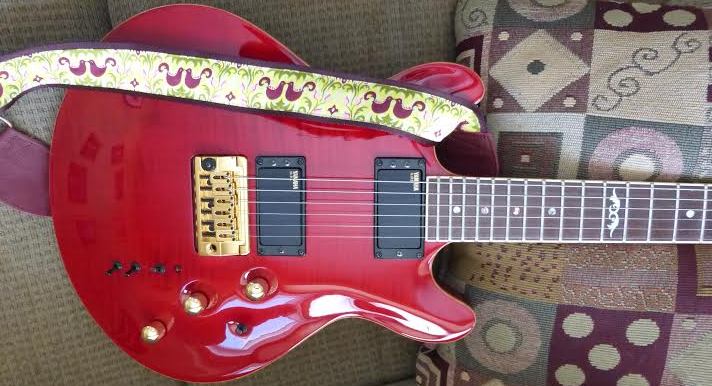
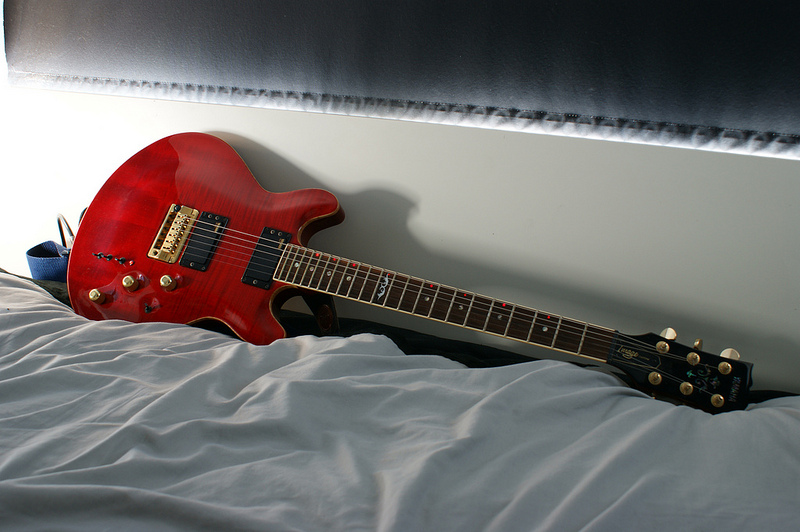
Yamaha MSG Image Early Designs and Prototypes
Martyn has asked me to record some information about the early guitars and prototypes and has sent me his own pictures.
This is what he has to say
I am quite keen for you to add this info to your website for posterity – I am 73 now and trying desperately to retire,
but it would be a shame if these details are not recorded. Attached is a photo of the first prototype which I put together (loosely!)
in Milton Keynes and took out to the factory in Taiwan in a suitcase. Also you will see a picture of the first four factory production
prototypes. Alan Murphy had the first Deluxe and I have still got one of the Standards. The Mark 1 headstock and volume pot position
are clearly visible on the Alan Murphy picture.
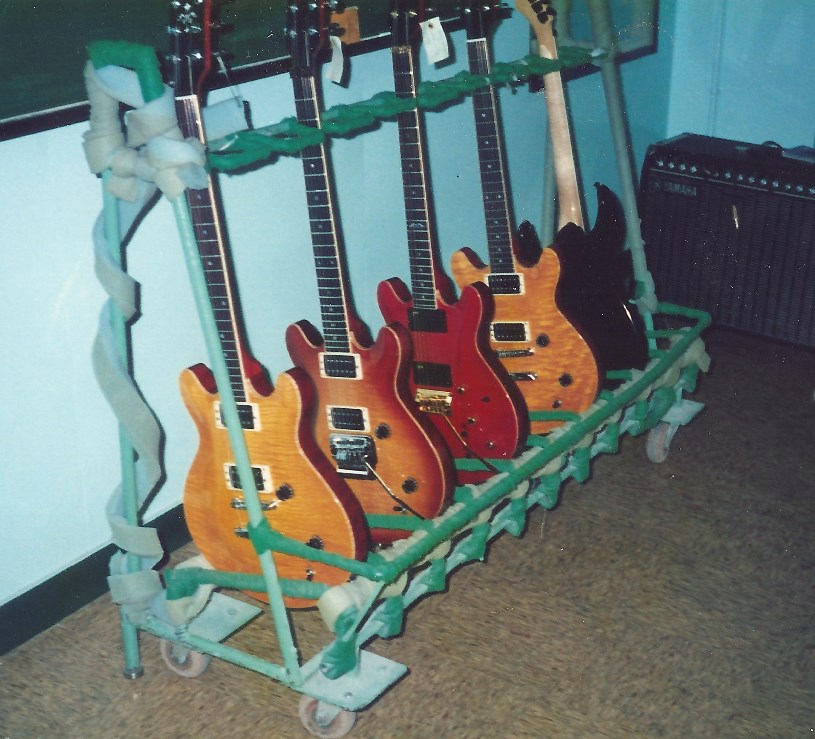
The first four MSGs ever produced
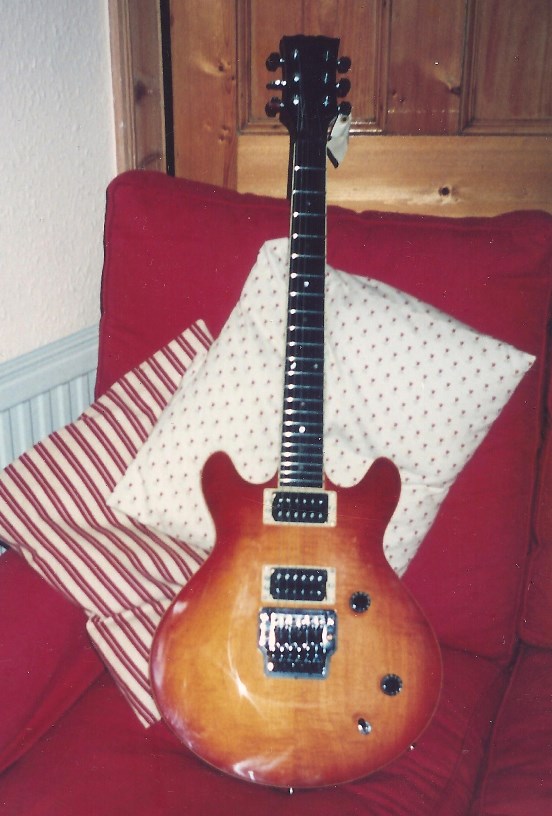
First prototype MSG Deluxe
.jpg)
Martyn's 1st ever standard
Update June 2017
For sale on the web is an Image Deluxe Special I can find very little information about this model. It appears to be a special
or limited run of the deluxe. The only differences being the colour of the guitar and the black hardware. If anyone knows any more about this
I would appreciate an E-mail.
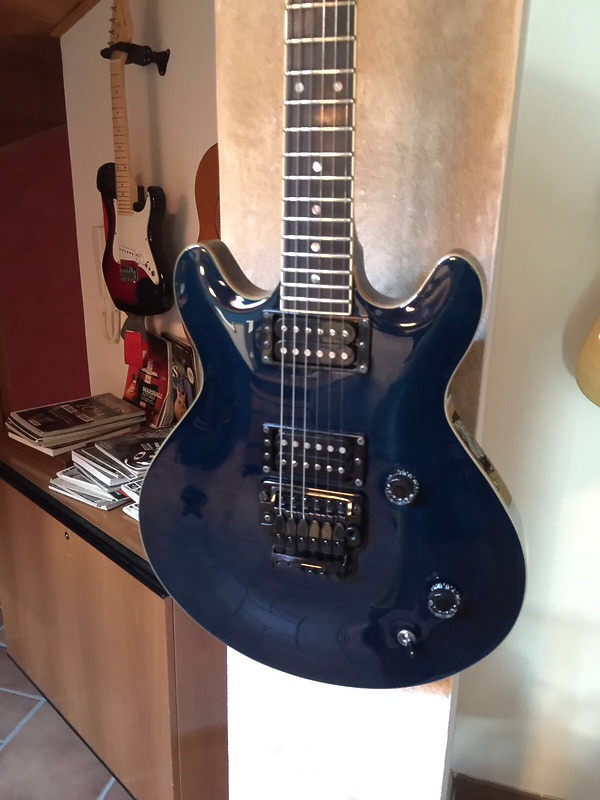
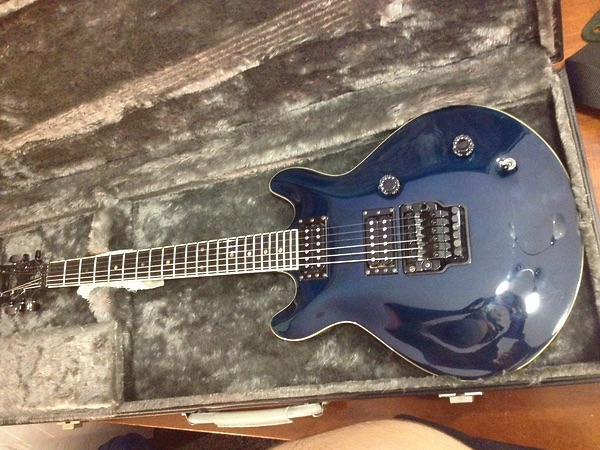
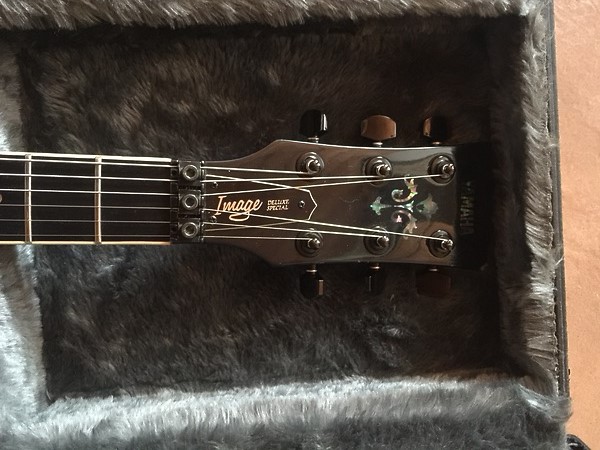
Update June 2022
The owner of the above guitar or one very like it is Andrea Rinaldi who tells me it was made in June 1989, this means it was
early in the production of the range. He has sent me some more pictures. He has changed the pickups but thankfully kept the originals

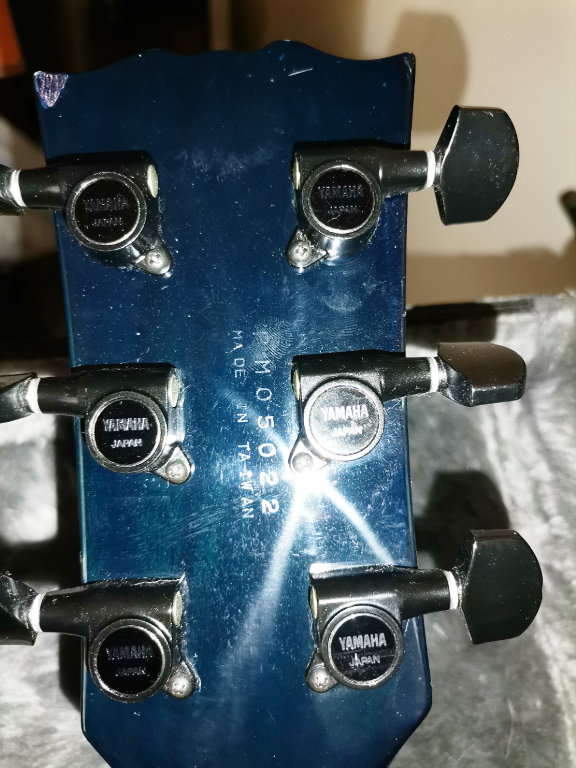
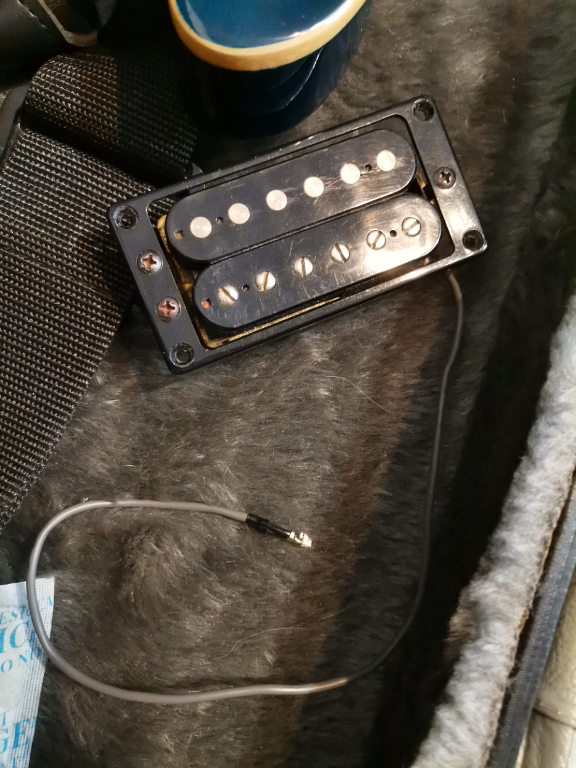

Includes an picture of the original pickup
From Martyn on the Blue Image
Nice to hear from you again. I see the mystery of the Blue Image/MSG guitars continues!
I have only ever seen one, and that was a refinished Standard here in the UK. I have received information about two Blue Deluxes
in Italy (Serial numbers PM 07027 and PN 11116). I seem to recall one of them was stamped “made in Japan” but I certainly didn’t
realise there were any made in Japan in the years I worked for Yamaha.
I can only guess that maybe the Italian distributor put in a special order for a few, or had them refinished in Italy.
Do you have a serial number for the one on your website?( see picture above) I note that it has a Deluxe Special truss rod cover
which I have never seen before. The other interesting thing is that it is a Mark 1 body (The volume pot is close to the strings!)
By the look of the headstock curve to the nut, that is also probably a Mark 1. The very top of the head would be the decisive evidence
if it was visible.
A little intrigue April 2018
The picture below is from a Yamaha catalogue and seems to indicate that some MSGs and other guitars may have been made in the UK
I haven't seen any and can't find anyone who has does anyone out there know more.
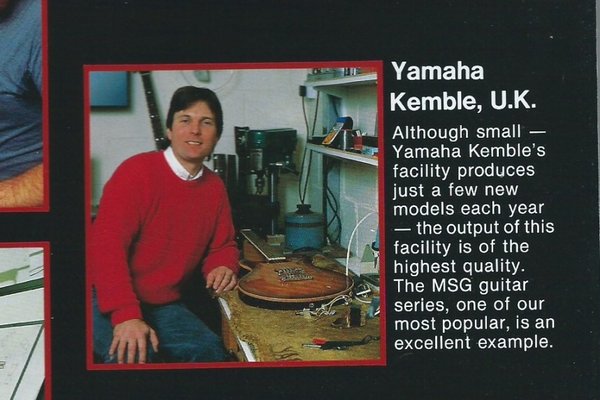
Update May 2019
I emailed Martyn Booth querying the made in UK situation and here's his reply. Thanks Martyn
Hi Bill
Nice to hear from you! I've just had a quick look at your website - keep up the good work!
The picture of me on the MSG page was taken in the old workshop in Mount Avenue, Bletchley where I did the design work on the
MSG and three others which never got into production.
The AEX1500 also started life there after I had a meeting with Martin Taylor to discuss the specification he wanted. I had the idea
of mixing a piezo system in the bridge with a Johnny Smith style magnetic pickup which he
liked and subsequently used on the "Nicole/Papa" Renault Clio adverts of the time. Basic design work was then sent to Jackie Minacucchi
in Japan and was finally completed after I had left the company.
All the MSG guitars were made in Taiwan apart from the mock-up prototype which I took over in two parts in a suitcase! During the years I was at
Yamaha all MSG guitars were QC inspected and set up before despatch to the dealers by me or Mick Sweeney. I left at the end of
December 1990 (Yamaha had informed me they were closing the MSG production line as the American
market wanted to run American designs rather than any from the UK.)
As the US market was 50% of the total at the time, even the MSG was no longer viable and as far as I am aware the last ones were made
in November 1991.
I have a huge file of MSG info! In those days all the communication during the production set up was done by fax so you can imagine how slow it all
was. I also have some original brochures and service/parts lists, and photos of the prototypes. One day I'll get to sorting it all out!
Update 2024
I have an amazing Email from Steve Blackburn. It would appears he owns a prototype MSG verified by Martyn Booth here are the details
from his email.
Hi Bill, I am the owner of the Yamaha MSG Custom prototype, the one on the rack of guitars in the Taiwan factory on the photo
on your site. I bought it from Sounds Great in 1993 (see attached invoice) and got a discount because the case was marked. It has been
and indeed is still gigged regularly and is in almost perfect condition. I only found out it was the prototype much later when one of
the microswitches broke and I contacted Martyn Booth for a replacement. I described the guitar and the fact that it had a roller nut
and no guitar model name on the truss rod cover and he was pleased to find out where it was. It originally had black pickup ring covers
but somewhere along the line they had been changed to white prior to me purchasing the guitar. I've recently sourced some black ones
from Martyn but have not fitted them as yet, he was kind enough to enclose a letter confirming that mine is indeed the prototype along
with the black pickup rings. It does explain why the case was marked because it had probably done some miles being transported between
guitar shows etc. Anyway hope this proves a worthy addition to your site,
Regards, Steve

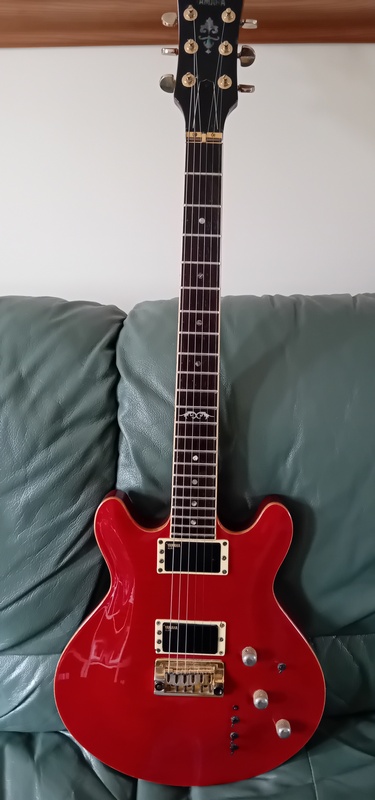
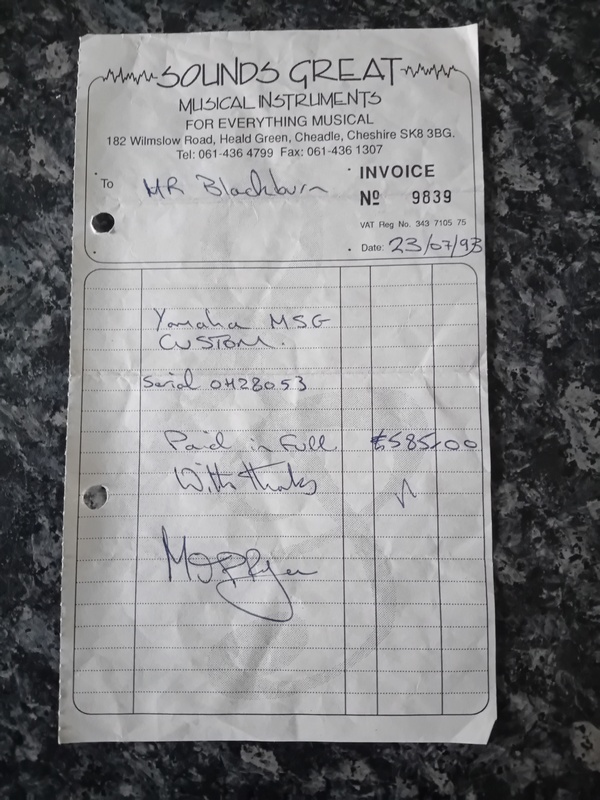
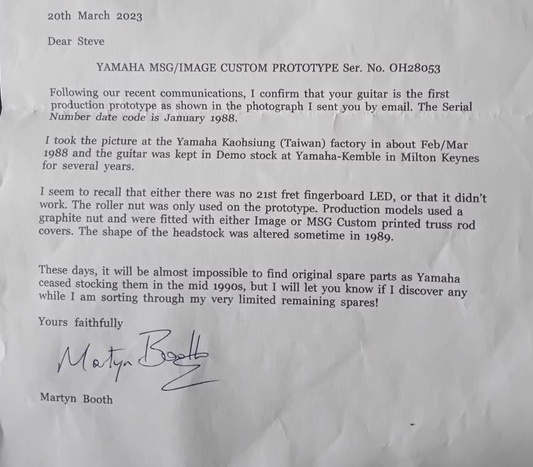
Thank you Steve
Service Manuals
June 2023
Martyn Booth via Joe Sparicio has provided the service manual for the MSG/Image Standard
The MSG Image Standard Manual
Comment from Martyn
If the push/push pot is broken you can use Allparts EP-0283-000 250k or EP-0296-000 500k.
But if you still have the original Yamaha knobs remember these are metric splines and the USA pots are imperial fitting!
You will need to drill out the knob a fraction bigger to fit it but try and leave some of the metric splines intact so it will still grip!
When removing knobs from push/push pots ensure the pot is in the UP position – otherwise the latching mechanism will be broken.
Joe has provided another manual the full Image manual thanks Joe
The Image Manual
Buzzard from the Yamaha Forum has kindly provided the following Manual thank you Peter.
The MSG Image Custom Manual